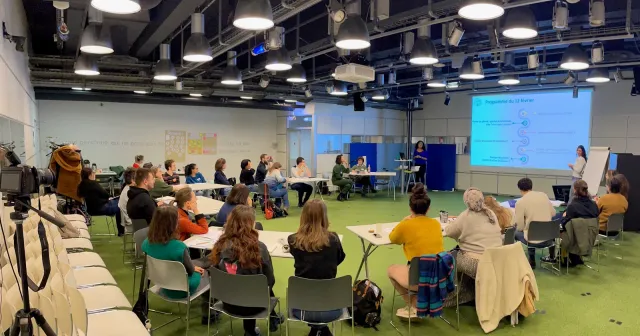The DALI Framework: the journey to create a Data Literacy Framework

Data literacy
In today's digital era, the importance of data literacy cannot be overstated. Understanding and effectively utilizing data has become crucial for navigating the complex digital landscape and empowering individuals in various professional and personal contexts. Adult education is one education sector that reaches a large number of adult learners and thus has the potential to instil data literacy. The DALI project (Data Literacy for Citizenship) embarked on a transformative journey to co-create a comprehensive framework for data literacy that can be used as a guideline by adult education institutions and adult educators alike. By incorporating playful learning strategies and stakeholder engagement, DALI aims to enhance learning demand and uptake among adult learners.
Co-Creation of the DaLi framework
DALI recognizes the need to define the field and boundaries of data literacy as a means of empowering individuals and strengthening their agency in the digital world. While previous approximations to data literacy have been made, DALI takes a more comprehensive approach. Inspired by its project aims, DALI took a co-creation approach to develop its own framework, fostering collective reflection and reconciling interdisciplinary and cross-cultural interpretations of data literacy. The project recognized the importance of involving not only experts but also diverse perspectives to capture the inherent complexity of the data literacy phenomenon. To achieve this, DALI employed a Delphi study, which leverage the theoretical and ideological diversity of the professionals involved.
The DALI project's co-creation journey to develop a framework for data literacy has paved the way for enhanced understanding and utilization of data in the digital age. By incorporating playful learning strategies, stakeholder engagement, and diverse perspectives, DALI strives to increase learning demand and uptake among adult learners. The resulting framework, the DALI framework, based on the latest standards and inspired by the complexities of data literacy, provides a comprehensive roadmap for individuals to navigate the data-driven world effectively.
The DaLi framework
Building on the structure of the European DigComp framework, the DALI Framework reconciles all these considerations into four main elements. Three of them are mainly independent of each other, even though in some cases the boundaries between them overlap: (1) Understanding Data, (2) Acting on Data, and (3) Engaging Through Data. An extra element is considered transversal: (4) Ethics & Privacy. While it is present in (1), (2) and (3) in terms of content and indicators but it is, in itself, a fundamental element in all of them.
The DALI framework encompasses these components, offering indicators for three levels of development (basic to advanced proficiency) for each sub-competence in every competence area. By providing a detailed and structured approach, the DALI framework empowers learners to progress in their data literacy journey.
The DALI project's co-creation journey to develop a framework for data literacy has paved the way for enhanced understanding and utilization of data in the digital age. By incorporating playful learning strategies, stakeholder engagement, and diverse perspectives, DALI strives to increase learning demand and uptake among adult learners. The resulting framework, the DALI framework, based on the latest standards and inspired by the complexities of data literacy, provides a comprehensive roadmap for individuals to navigate the data-driven world effectively.
To retrieve further information about the project, please visit https://dalicitizens.eu/
Find the project on Twitter: @DaLi_Citizens
The project “Data literacy for citizenship” is funded under the grant agreement 2020-1-NO01-KA204-076492 by the European Commission. The European Commission's support for the production of this publication does notconstitute an endorsement of the contents, which reflect the views only of theauthors, and the Commission cannot be held responsible for any use which may be made of the information contained therein.




